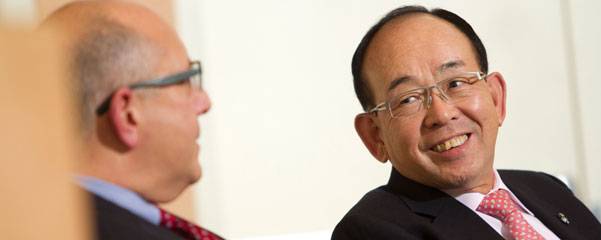Learning from Each Other
Tuck partners with Mitsui & Co., Ltd. for executive training and international understanding.

Earlier this fall, Tuck first-year students had a unique opportunity to see their homework come to life. The setting was a joint session of the courses, “Analysis for General Managers” and “Leading Organizations,” taught by professors Paul Argenti and William Joyce, respectively. As the students filed into Cook Auditorium, they found the main character from one of their case studies seated in the first row: Shoei Utsuda, the chairman and former president and CEO of Mitsui & Co., Ltd., a 40,000-employee Japanese firm whose businesses range from mineral resources and energy to global marketing, lifestyle products, and infrastructure services.
During the course of the session, Utsuda, speaking mostly through a translator, gave his personal account of the circumstances described in the case and, in response to questions from students, explained the rationale behind the decisions he made.
It wasn’t the first time Utsuda had been to Hanover. Over 40 years ago, he was one of nine Mitsui employees who studied at Dartmouth for one year from the late 1950s to 1969. The program grew out of a strong bond that Takanaga Mitsui, heir to the founder of the company, forged with Dartmouth as a member of the class of 1915 and a parent of Takanobu D’43 and Mamoru D’58.
Mitsui & Co.’s relationship with Tuck was kindled in 2007 by emeritus professor of international business Joseph Massey. Massey was deeply connected with the Japanese business community and, while meeting with leaders from Mitsui & Co., learned of their desire to send some of their employees to an American business school for executive training. Tuck stepped up and organized a program whereby a Mitsui executive trainee would take classes at Tuck and Dartmouth for one year before interning at an American corporation for another year. Since then, five Mitsui employees have studied at Tuck and Dartmouth, and the company sends at least one executive to the Tuck Executive Program every year.
Takehiro Sugitani, 28, is the Mitsui & Co. executive trainee at Tuck this year. Sugitani joined the firm in 2005 and works on developing its battery business in emerging markets. He explains that Mitsui & Co.’s business model is not to invest in existing operations but to build its own businesses around the world. As such, each executive is expected to seek out new business opportunities. “I have to learn the global context of business and general management,” he says, “so I decided to come to Tuck.”
As it happened, Sugitani got more than he bargained for. With Utsuda on campus in connection with the case study, Sugitani had the rare occasion to meet with the chairman of Mitsui & Co. and help him communicate the firm’s mission and values to students. “It’s been a great experience for me,” Sugitani says. “The classes are challenging and being in the Tuck community has really contributed to my personal development.”
That piece of serendipity can be traced back to the fall of 2009, when Dartmouth was working with Mitsui & Co. on a proposal for an endowed professorship in Japanese studies. The Mitsui executives were open to the proposal, but wanted to cultivate a deeper relationship with Dartmouth first. So they asked Dartmouth to write a business case that would tell the story of the company and show its holistic sense of corporate responsibility through a real-world example. Dartmouth then asked Tuck to develop the case, which was researched and written last year by a group of MBA fellows with the Center for International Business.
At the end of the joint class, Utsuda thanked the audience for the chance to help the western world better understand both Mitsui & Co. and the Japanese business culture. But he also expressed his gratitude for an unexpected benefit: the opportunity to think deeply about his own leadership style.
The feeling was mutual. Through the process of researching and writing the case, which entailed working closely with Mitsui & Co. executives on the facts of the scenario, Tuck learned a great deal about the Japanese way of business and strengthened its ties to a valuable corporate partner.